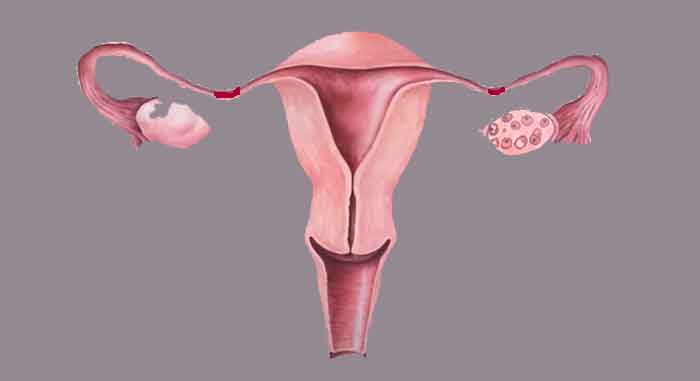There is an increase in the number of fallopian tube blockage issues that experts are handling. It is now common to find ladies of child bearing age that have gone for a tubal unblocking session.
To help you understand how important the fallopian tubes are, we will share a little information about them.
The fallopian tubes play a crucial role in fertility. They are responsible for transporting the egg from the ovary to the uterus for fertilisation.
The uterus is the open space in the middle of the image above.
It is amazing how fertilisation could happen once the sperm goes into the fallopian tube and hit the egg.
But all of that amazing science could become a dream and wish for a woman if one or both fallopian tubes are blocked.
The blockage would prevent the egg from reaching the uterus and this results in infertility. The egg does not have enough speed to unblock the tube. In short, the egg is so delicate that it must not hit anything on it ways to the uterus.
Causes Of Fallopian Tube Blockage
But what could make this blockage happen? Some women are in a loss as to why this incident that blocks procreation occur.
There are different things that could cause fallopian tube blockage, but we will just touch them lightly. We will then move on to a few things we also know could cause this blockage.
Fallopian tube blockage can occur due to a variety of factors, such as infections, scar tissue from surgery, endometriosis, or other underlying medical conditions.
Indeed, as a woman, your fallopian tubes are vulnerable to infection and surgical damage. These situations may impair function by affecting the delicate fimbriae or the highly specialised endosalpinx.
A fallopian tube obstruction occurs in 12% to 33% of infertile couples (1). Investigating the tubal potency early enough will help you know if your tubes can receive adventurous sperms.
Indeed, this obstruction often happen in the area that is like a valley, since particles or bacteria could settle there.
In this article we are looking at the role your food play in the health of your fallopian tube.
MSG And Fallopian Tube Issues
Unfortunately, most people grab items off shelfs in super stores without reading labels. As a result, they buy compounds that would give them negative effect like fallopian tube blockage.
There is a substance – MSG (monosodium glutamate) – that is a flavour enhancer commonly used in processed foods.
An animal study found something interesting and worth considering about this MSG and the female reproductive system. Top in the list of the organs is the fallopian tube.
According to the study, 24 adult female Wistar rats of average weight of 230g were given 0.04mg/kg and 0.08mg/kg of monosodium glutamate thoroughly mixed with the growers’ mash, respectively on a daily basis. There were grouped in twos – eight each. The 0.04mg and the 0.08mg.
After 14 days of this practice the fallopian tubes were carefully examined.
The researchers found that eight of the rats that received 0.08mg/kg of MSG had significant issues within the fallopian tubes.
Furthermore, the study concluded that MSG may have some deleterious effects on the fallopian tubes of adult female Wistar rats at higher doses and by extension may contribute to the causes of female infertility (2).
Basically, this means that frequent consumption of items with MSG could result in excess of it in the system. At that point, it becomes a causative agent of tubal issues.
This finding calls for caution, even though the study did not out rightly say MSG could cause fallopian tube blockage.
What is most remarkable is what MSG truly does.
Do you know that people use MSG as a bleaching agent to remove stain from fabrics? When they do, it actually flushes off the stain from the fabric.
This should also tell you what could happen to the linings of organs when they come in contact with MSG.
Where MSG Hides In Food You Eat
Basically, if you have been trying to conceive and you find that there is tubal blockage, one of the things we advise you eliminate from your diet is processed foods and seasoning cubes.
Those who eat noddle and use the spice that comes with it could be eating MSG without knowing.
You see, MSG boosts the flavor of foods by stimulating taste receptors.
Also, studies have it that it increases the acceptance of particular flavors. Adding MSG to foods results in that scrumptious taste, which comes to you as savoury and meaty (3).
That said, making your own seasoning and reading labels of foods you eat are two priceless habits to grow.
Related Articles You Should Read
- How To Make MSG-Free Seasoning
- Side Effects Of Seasoning Cubes You Should Know
- Negro Pepper, Uda And Fertility
Most importantly, take a decision that will help you keep MSG away as much as possible especially if you have fallopian tube blockage.
Again, while there is no direct link between MSG consumption and fallopian tube blockage, some studies suggest that excessive consumption of foods with MSG and other additives may be harmful to reproductive health.
Note, some companies do not refer to this substance by the MSG name.
You could find things like monosodium salt, monohydrate, sodium glutamate monohydrate or glutamic acid. All of these are the same MSG.
Watch out for them and see that you keep them out. In no time you could have those tubes ready for fertilisation of egg.


